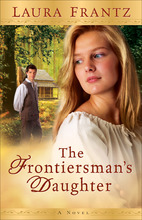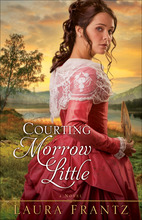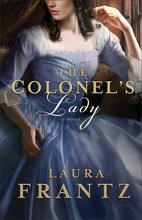 The Frontiersman's Daughter is an epic novel of a girl born and raised in Kentucky, who has a rare chance to live in tenuous peace with both the whites and Shawnee. Others on the frontier are less lucky - homes burned out, families massacred, forts attacked - yet she lives nearly wild, courted by Shawnee, frontiersman, and gentleman alike. The novel focuses on the simple life of those who were brave enough to make their homes on the wild frontier.
The Frontiersman's Daughter is an epic novel of a girl born and raised in Kentucky, who has a rare chance to live in tenuous peace with both the whites and Shawnee. Others on the frontier are less lucky - homes burned out, families massacred, forts attacked - yet she lives nearly wild, courted by Shawnee, frontiersman, and gentleman alike. The novel focuses on the simple life of those who were brave enough to make their homes on the wild frontier.  In Courting Morrow Little, Frantz looks closer at the war between the Blue Coats (Americans) and native tribes, and how the Americans broke many treaties without punishment in order to destroy as many of the Native Americans as possible. As experienced through Morrow Little's eyes, this novel shows the unfairness to the Indians by many of the Americans in their war to take control of the country, and the unfairness to any white person who would live with them (for they surely must be either a traitor or a captive held against their will).
In Courting Morrow Little, Frantz looks closer at the war between the Blue Coats (Americans) and native tribes, and how the Americans broke many treaties without punishment in order to destroy as many of the Native Americans as possible. As experienced through Morrow Little's eyes, this novel shows the unfairness to the Indians by many of the Americans in their war to take control of the country, and the unfairness to any white person who would live with them (for they surely must be either a traitor or a captive held against their will).  Almost as a response to Courting Morrow Little, but on the other side of the conflict, The Colonel's Lady looks at life on a frontier military fort as they battle the British and Indians. Many of the Native Americans had, in conjunction with the loss of their homes and territory, been incited by the British to fight the people living on the frontier. Much like in the French and Indian War, the British made promises so that the Native Americans would fight for them, though against the colonial Americans now rather than the French. The novel also looks at the dismal existence as a soldier, where alcohol was one of the few ways to escape from the pain of injuries, dysentery, and loss of friends in the many skirmishes of the war, and where desertion and suicide were the main alternatives.
Almost as a response to Courting Morrow Little, but on the other side of the conflict, The Colonel's Lady looks at life on a frontier military fort as they battle the British and Indians. Many of the Native Americans had, in conjunction with the loss of their homes and territory, been incited by the British to fight the people living on the frontier. Much like in the French and Indian War, the British made promises so that the Native Americans would fight for them, though against the colonial Americans now rather than the French. The novel also looks at the dismal existence as a soldier, where alcohol was one of the few ways to escape from the pain of injuries, dysentery, and loss of friends in the many skirmishes of the war, and where desertion and suicide were the main alternatives. One thread that holds these books together, though, is God's love and forgiveness for any and all people - whether a simple frontiersman's daughter and gentleman doctor, a lady who chooses life with a half-breed over the whites, or a spinster and an officer in the Rebel army. While the boundaries of who is right and who is wrong are brought into question in these novels, God's love and control are not; He is the bedrock that cannot be moved, and it is His desire that none should be lost.
No comments:
Post a Comment